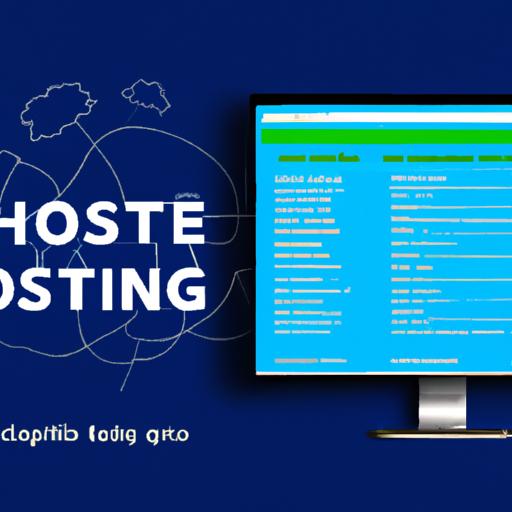Cloud Based Server Hosting: Unleashing the Power of Flexibility and Efficiency
Introduction
Welcome to the world of cloud based server hosting, the revolutionary solution that has transformed the way businesses manage their online presence. In this article, we will delve into the definition and concept of cloud based server hosting, as well as explore the numerous benefits and advantages it offers.
Definition and concept of cloud based server hosting
Imagine a server infrastructure that is not bound to physical hardware, but rather exists in a virtual space, accessible from anywhere in the world. That’s the essence of cloud based server hosting. It involves hosting your website, applications, and data on virtual servers that are stored and managed by a third-party provider. This means you no longer need to invest in expensive physical servers or worry about maintaining them. Instead, you can rely on the provider’s infrastructure to handle your hosting needs.
Benefits and advantages of using cloud based server hosting
-
Scalability and flexibility: With cloud based server hosting, you have the power to scale your resources up or down based on your needs. Whether you experience a sudden surge in website traffic or need additional storage space, the cloud can effortlessly accommodate your requirements. Say goodbye to the limitations of physical servers and embrace the freedom to adapt to changing demands.
-
Cost-effectiveness and resource optimization: Traditional server hosting often involves paying for more resources than you actually need to ensure stability during peak periods. However, with cloud based server hosting, you only pay for what you use. This efficient allocation of resources allows you to optimize costs and allocate your budget more effectively.
-
High availability and reliability: Cloud based server hosting offers unparalleled reliability and uptime. Hosting providers distribute your data across multiple servers, ensuring that even if one server fails, your website or application remains accessible. This redundancy minimizes downtime and ensures a seamless user experience.
As we embark on this journey through the world of cloud based server hosting, we will explore its key features, considerations when choosing a provider, best practices for implementation, challenges you may encounter, and the exciting future that lies ahead. So, fasten your seatbelt and get ready to unlock the full potential of cloud based server hosting!
Understanding the Key Features of Cloud Based Server Hosting
In this section, we will delve into the key features that make cloud based server hosting an exceptional choice for businesses. From scalability and flexibility to cost-effectiveness and resource optimization, let’s explore the remarkable advantages it offers.
Scalability and flexibility of cloud based server hosting
One of the standout features of cloud based server hosting is its ability to scale resources on-demand. Traditional hosting often requires manual upgrades or downgrades of physical servers, leading to downtime and potential disruptions. However, with cloud based server hosting, you can effortlessly scale your resources up or down with just a few clicks. Whether you experience a sudden spike in website traffic or need additional storage space, the cloud provides the flexibility to accommodate your needs instantaneously.
Furthermore, cloud based server hosting enables you to tailor your resources precisely to your requirements. You can easily adjust CPU, RAM, storage, and bandwidth to ensure optimal performance for your website or application. This level of control empowers you to deliver an exceptional user experience while efficiently managing your costs.
Cost-effectiveness and resource optimization in cloud based server hosting
Gone are the days of investing in costly physical servers that may remain underutilized for extended periods. With cloud based server hosting, you only pay for the resources you use. This pay-as-you-go model allows you to optimize your costs and allocate your budget more effectively. You no longer need to predict your future requirements and invest in excess capacity, as the cloud provides the flexibility to scale resources up or down as needed.
Moreover, cloud based server hosting eliminates the need for in-house server maintenance and IT support. The hosting provider takes care of hardware updates, security patches, and infrastructure management, freeing up your resources to focus on your core business objectives. This shift from capital expenditure (CapEx) to operational expenditure (OpEx) provides businesses with greater financial flexibility and agility.
High availability and reliability of cloud based server hosting
Downtime can be disastrous for businesses, leading to lost revenue and damaged reputation. Cloud based server hosting offers exceptional levels of availability and reliability. Hosting providers employ redundant infrastructure, distributing your data across multiple servers and data centers. This ensures that even if one server or data center experiences issues, your website or application remains accessible. The cloud’s robust architecture and automated failover mechanisms minimize downtime and provide uninterrupted service to your users.
In the next section, we will discuss the crucial factors to consider when choosing a cloud based server hosting provider, including security measures, performance considerations, and customer support. Stay tuned as we unravel the secrets to making an informed decision that aligns with your business needs.
Factors to Consider when Choosing a Cloud Based Server Hosting Provider
In the vast landscape of cloud based server hosting providers, finding the perfect match for your business can be a daunting task. To help you navigate this decision-making process, let’s explore the crucial factors you should consider when selecting a provider.
Security measures and data protection in cloud based server hosting
When entrusting your valuable data to a cloud based server hosting provider, security should be at the forefront of your mind. Look for providers that offer robust security measures, such as encryption protocols, firewalls, and regular security audits. Consider their data protection policies, including backup and disaster recovery plans. A reputable provider should adhere to industry standards and regulations to ensure the safety and confidentiality of your data.
Performance and speed considerations in cloud based server hosting
To provide an exceptional user experience, your website or application must deliver fast and reliable performance. When evaluating cloud based server hosting providers, assess their network infrastructure, server hardware, and bandwidth capacity. Look for providers with strategically located data centers that can minimize latency and ensure speedy data transfer. Additionally, consider their track record in delivering consistent performance and their ability to handle peak traffic loads.
Customer support and service level agreements in cloud based server hosting
Even with a reliable infrastructure, occasional issues may arise. That’s why responsive and knowledgeable customer support is a vital aspect to consider. Evaluate the provider’s support channels, response times, and availability. Do they offer 24/7 support? Are they responsive to your inquiries? Additionally, review their service level agreements (SLAs) to understand the guarantees they provide in terms of uptime, performance, and support. A reputable provider will have transparent SLAs that align with your business needs.
By considering these factors, you can make an informed decision when choosing a cloud based server hosting provider. Remember, security, performance, and reliable support are the pillars that will support your online presence. So, take the time to research and compare providers, ensuring that they align with your business goals and requirements. In the next section, we will explore the best practices and steps for implementing cloud based server hosting.
Implementing Cloud Based Server Hosting: Best Practices and Steps
Assessing your hosting needs and requirements
Before diving into the realm of cloud based server hosting, it is crucial to assess your specific hosting needs and requirements. Consider factors such as the size of your website or application, expected traffic volume, and the resources it requires to function optimally. By conducting a thorough analysis, you can determine the appropriate cloud hosting plan that suits your needs and ensures seamless performance.
Selecting the appropriate cloud based server hosting provider
Choosing the right cloud based server hosting provider is a critical decision that can significantly impact your online presence. Take the time to research and evaluate various providers, considering factors such as reliability, security measures, scalability options, and pricing models. Look for providers with a proven track record, positive customer reviews, and a strong reputation in the industry. Remember, the provider you select will be your partner in hosting your website or application, so choose wisely.
Setting up and configuring your cloud based server hosting environment
Once you have chosen a cloud based server hosting provider, it’s time to set up and configure your hosting environment. This typically involves creating an account with the provider, selecting the appropriate server configuration, and configuring settings such as storage, bandwidth, and security protocols. The provider will guide you through the process, offering step-by-step instructions and documentation to ensure a smooth setup.
During the configuration process, pay attention to security measures. Implementing strong passwords, enabling two-factor authentication, and regularly updating your software are essential practices to safeguard your data and protect against potential cyber threats.
Additionally, consider optimizing your cloud environment for performance. This may involve fine-tuning settings, implementing caching mechanisms, and leveraging content delivery networks (CDNs) to ensure fast and reliable access to your website or application.
By following these best practices and steps, you can successfully implement cloud based server hosting and unleash its full potential for your online presence. So, let’s move forward and explore the common challenges and solutions that arise in the world of cloud based server hosting.
Common Challenges and Solutions in Cloud Based Server Hosting
As with any technology, cloud based server hosting comes with its own set of challenges. In this section, we will explore some of the common hurdles you may encounter when utilizing cloud based server hosting, along with effective solutions to overcome them.
Data migration and integration challenges in cloud based server hosting
When transitioning your infrastructure to the cloud, one of the primary challenges you may face is migrating your existing data and integrating it seamlessly with the cloud environment. This process requires careful planning and execution to ensure a smooth transition without any data loss or disruptions. Additionally, compatibility issues between different systems and applications can further complicate the migration process.
To overcome these challenges, it is crucial to thoroughly assess your data requirements and develop a comprehensive migration plan. Consider utilizing specialized migration tools and services offered by your cloud hosting provider to simplify the process. Additionally, ensure that your cloud environment is compatible with your existing systems and applications by conducting thorough compatibility tests and addressing any compatibility issues before the migration.
Managing and optimizing cloud resources in cloud based server hosting
The dynamic nature of cloud based server hosting brings its own set of challenges in resource management. With the ability to scale resources up and down based on demand, it becomes essential to optimize resource allocation to avoid unnecessary costs and ensure optimal performance. Failure to manage and optimize resources effectively can result in overprovisioning, underutilization, and increased expenses.
To address these challenges, it is important to regularly monitor and analyze your resource usage patterns. Utilize monitoring tools provided by your hosting provider to gain insights into resource utilization and identify potential bottlenecks. Implement automation and scaling strategies to dynamically allocate resources based on demand. This will help you optimize costs and ensure optimal performance without compromising on efficiency.
Ensuring data backup and disaster recovery in cloud based server hosting
While cloud based server hosting offers enhanced reliability and redundancy, it is essential to have a robust data backup and disaster recovery strategy in place. Accidental data loss, cyber attacks, or natural disasters can still pose a threat to your data, and without proper measures in place, you may risk losing critical information.
To mitigate these risks, regularly backup your data to multiple locations within the cloud infrastructure. Implement automated backup processes to ensure consistency and reliability. Additionally, consider utilizing disaster recovery services offered by your hosting provider. These services replicate your data and infrastructure to a secondary location, allowing for swift recovery in the event of a disaster.
By addressing these common challenges and implementing effective solutions, you can maximize the benefits of cloud based server hosting while ensuring the security, reliability, and efficiency of your infrastructure. Stay tuned as we explore the exciting future of cloud based server hosting in the next section!
Conclusion: Embracing the Future of Cloud Based Server Hosting
In conclusion, cloud based server hosting is a game-changer in the world of web hosting. Its flexibility, scalability, and cost-effectiveness make it an ideal choice for businesses of all sizes. By shifting from traditional physical servers to the cloud, you can unlock a multitude of benefits that not only enhance your online presence but also streamline your operations.
Cloud based server hosting eliminates the need for upfront investments in hardware and the hassle of maintenance. It empowers you to scale your resources effortlessly, ensuring that you can handle fluctuations in website traffic and user demands. With pay-as-you-go pricing models, you can optimize your budget and allocate resources where they are needed the most.
Moreover, the high availability and reliability of cloud based server hosting guarantee that your website or application remains accessible to users at all times. The distributed nature of the cloud infrastructure minimizes downtime and ensures a seamless experience, keeping your customers satisfied and engaged.
Looking to the future, cloud based server hosting is poised to continue evolving and innovating. Emerging trends such as serverless computing and edge computing are reshaping the landscape, offering even more possibilities for businesses to leverage the power of the cloud. As technology advances, we can expect faster speeds, enhanced security measures, and improved performance in cloud based server hosting.
So, whether you’re a small business owner looking to establish an online presence or a large enterprise seeking to optimize your infrastructure, cloud based server hosting is the key to unlocking efficiency, flexibility, and success. Embrace the future of web hosting and harness the full potential of the cloud!
Remember, the cloud is not just a place where your data resides, it’s a gateway to endless possibilities. So, why wait? Take the leap and embrace the power of cloud based server hosting today!
“The cloud services companies of all sizes…The cloud is for everyone. The cloud is a democracy.” – Marc Benioff
Note: The above quote can be used as an optional addition to conclude the article.






